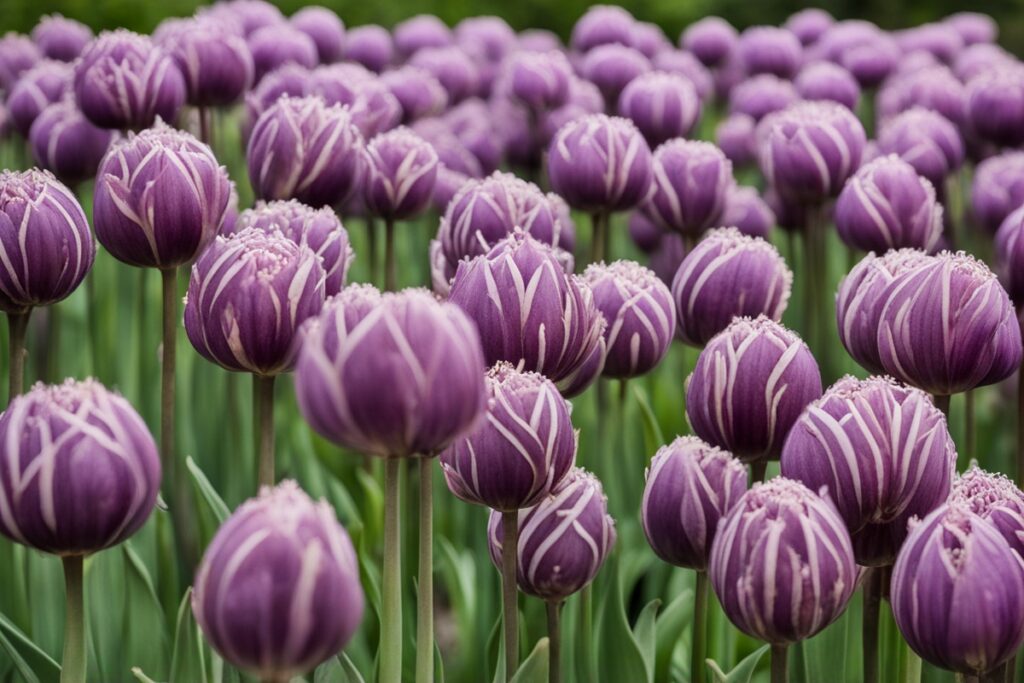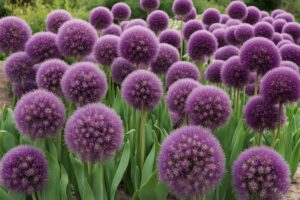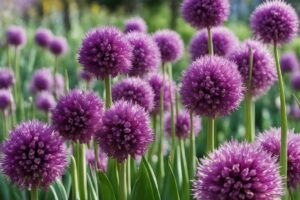Let’s face it: growing allium bulbs—those gorgeous, onion-like plants that give your garden a burst of color and structure—can feel like a labor of love. But nothing stings quite like seeing your hard work nibbled away by pests. If you’ve ever walked out to your garden only to find chewed leaves or damaged bulbs, you know the frustration I’m talking about. The good news? You don’t have to resort to harsh chemicals to keep those critters at bay. Protecting allium bulbs from pests naturally is not only possible but also rewarding, both for your garden and the environment. In this guide, I’ll walk you through tried-and-true methods that I’ve used myself, backed by expert insights, to keep your alliums thriving without synthetic pesticides. Let’s dig in—pun intended!
Why Protect Allium Bulbs From Pests Naturally?
Before we get into the how, let’s talk about the why. Alliums, which include ornamental varieties like globe alliums and edible ones like garlic and onions, are generally pretty tough. Their strong scent often deters pests naturally. But they’re not invincible. Voles, aphids, and onion maggots can still wreak havoc if given the chance. So why go the natural route to protect allium bulbs from pests? For starters, chemical pesticides can harm beneficial insects like bees and ladybugs—creatures you want hanging around your garden. Plus, if you’re growing edible alliums, do you really want to eat something doused in synthetic toxins? I know I don’t. Natural pest control keeps your ecosystem balanced and your harvest safe. It’s a win-win.
Know Your Enemies: Common Pests That Target Allium Bulbs
Imagine you’re tending your garden, admiring the tall, sculptural blooms of your purple alliums, when you notice something’s off. Leaves are wilting, or worse, there are holes in your bulbs. Who’s the culprit? Identifying the pest is the first step to protecting allium bulbs from pests naturally. Here are the usual suspects:
- Voles: These tiny rodents love to munch on bulbs underground. I’ve lost a few garlic bulbs to voles in the past, and trust me, it’s heartbreaking to dig up a patch and find nothing but chewed remains.
- Aphids: These sap-sucking insects cluster on stems and leaves, weakening the plant. They’re a pain, but thankfully, easy to spot.
- Onion Maggots: The larvae of onion flies, these pests burrow into bulbs, causing rot. They’re particularly sneaky since the damage often happens below the soil.
Knowing what you’re up against helps tailor your defense. Keep an eye out for telltale signs like yellowing leaves or disturbed soil, and act fast. The sooner you intervene, the better your chances of saving your crop or display.
Barrier Methods: Physical Protection for Allium Bulbs
One of the simplest ways to protect allium bulbs from pests naturally is to create a physical barrier. Think of it as putting up a “keep out” sign for unwanted visitors. When I first started growing garlic, voles were my arch-nemesis. After some trial and error, I discovered that planting bulbs in wire mesh cages worked wonders. You can buy or make small cages out of hardware cloth and bury them in the soil with the bulb inside. It’s a bit of extra work upfront, but it keeps rodents at bay without a drop of pesticide.
For above-ground pests like aphids, consider floating row covers. These lightweight fabrics let in sun and water but block insects. Just be sure to secure the edges so nothing sneaks underneath. Barriers aren’t foolproof—nothing is—but they’re a fantastic first line of defense and a staple in organic gardening.
Companion Planting: Nature’s Pest Repellent
Have you ever noticed how some plants just seem to get along better with others? That’s the magic of companion planting, and it’s a game-changer for protecting allium bulbs from pests naturally. Alliums already have a strong smell that repels many insects, but pairing them with certain plants can amplify that effect. For instance, planting marigolds nearby can deter aphids and nematodes with their pungent aroma. I’ve tried this in my own garden, and while it’s not a complete cure, I’ve definitely seen fewer pests on my alliums since adding marigolds to the mix.
Herbs like mint and rosemary can also help. Their strong scents confuse or repel pests, making your alliums less of a target. Just a word of caution—mint spreads like wildfire, so keep it in a pot unless you want a garden takeover. Companion planting isn’t just practical; it also makes your garden look more diverse and vibrant. Why not give it a shot?
Natural Repellents and Homemade Solutions
If barriers and companion plants aren’t enough, it’s time to roll up your sleeves and whip up some natural repellents. One of my go-to solutions for protecting allium bulbs from pests naturally is a garlic spray—ironic, right? Blend a few garlic cloves with water, strain the mixture, and add a drop of dish soap to help it stick to leaves. Spray it on your alliums to deter aphids and other soft-bodied pests. I’ve used this for years, and while the smell isn’t exactly pleasant, it works without harming the plant or the environment.
Another option is neem oil, a natural pesticide derived from the neem tree. It’s effective against a range of pests, including aphids and onion maggots, and it’s safe for most beneficial insects when used correctly. Dilute it according to the label and apply it during cooler parts of the day to avoid leaf burn. These solutions aren’t overnight miracles, but with consistent use, they can significantly reduce pest pressure. Plus, there’s something satisfying about outsmarting bugs with stuff from your kitchen or a simple organic product.
Encouraging Beneficial Insects and Wildlife
Here’s a little secret: sometimes the best way to protect allium bulbs from pests naturally is to let nature do the heavy lifting. Beneficial insects like ladybugs and lacewings are voracious predators of aphids and other small pests. To attract them, plant nectar-rich flowers like yarrow or dill near your alliums. I remember the first time I saw a ladybug feasting on aphids in my garden—it felt like I’d hired a tiny, spotted bodyguard for free!
You can also encourage birds, which eat a variety of garden pests, by setting up feeders or birdhouses. Just be mindful that some birds might peck at your plants too, so balance is key. Creating a garden that supports beneficial wildlife not only helps with pest control but also makes your space feel alive and interconnected. Isn’t that what gardening is all about?
References
- University of Minnesota Extension – Protecting Bulbs from Pests
- Royal Horticultural Society – Allium Pests and Diseases
- Colorado State University Extension – Natural Pest Control in the Garden
- Missouri Botanical Garden – Pest and Problem Advice
- Penn State Extension – Companion Planting Guide
Disclaimer: This article is for informational purposes only and is based on general research, personal experience, and insights from reputable gardening resources. It is not intended to serve as a substitute for professional advice. Gardening conditions, pest pressures, and individual circumstances can vary widely, so results from the methods described may differ. Always consult a qualified professional, such as a local extension agent or certified horticulturist, for personalized guidance tailored to your specific situation. Use natural pest control methods with caution, following product instructions where applicable, and prioritize safety for yourself, your plants, and the environment.
This content is for informational purposes only and not a substitute for professional advice.




